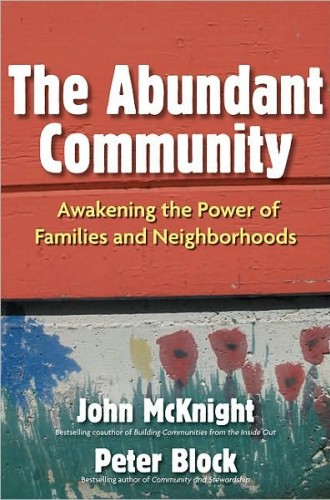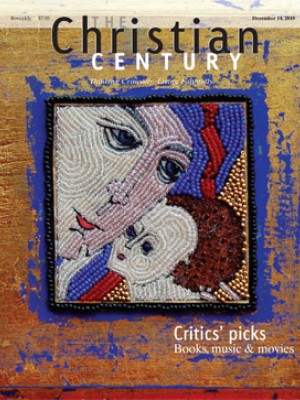A review of The Abundant Community
The mantra of the real estate business is "location, location, location." In this attention-meriting book, the mantra is "local, local, local." John McKnight (professor emeritus at Northwestern University) and Peter Block (partner at Designed Learning in Cincinnati) have both written previously about the nurture of local community. Now they offer a remarkable treatise concerning the crisis of our society and a response to it that summons us back to the neighborhood.
The book's critical edge is its emphasis on "the conversion from citizen to consumer" that has happened in recent times. The antidote that McKnight and Block propose is a reverse process, with consumers retaking their proper roles as citizens.
The terms of the argument are crucial:
A consumer is one who has surrendered to others the power to provide what is essential for a full and satisfied life. This act of surrender goes by many names; client, patient, student, audience, fan, shopper. All customers, not citizens. Consumerism is not about shopping, but about the transformation of citizens into consumers.
Read our latest issue or browse back issues.
A citizen is one who is a participant in a democracy, regardless of their legal status. It is one who chooses to create the life, the neighborhood, the world from their own gifts and the gifts of others. . . . They function as full participants in what is necessary for a democracy to work.
The book falls readily into two parts, on consumerism and citizenship, respectively. The discussion of consumerism will not be completely unfamiliar to readers of the Christian Century, but the authors' characterization of consumers is poignant and suggestive. Their accent is not on an insatiable need for consumer goods but on the abdication of responsibility for neighborly life and the entrustment of common life to corporations, institutions or systems at the expense of neighborly interaction. McKnight and Block focus on the way in which we as a society have come to rely on specialists and experts to meet our many social needs and thus no longer look to the neighborhood for associational support. We rely increasingly on therapists, life coaches, financial advisers, consultants and social workers.
In our endless pursuit of "need satisfaction," which mostly will not lead to a satisfied life, the human condition of need, frailty, vulnerability and eventual mortality is converted into a problem to be solved. Care becomes commodified and reduced to a curriculum that can be certified and taught in a routinized way. Personal secrets are entrusted to professionals and kept from family members. A management mind-set takes over: everything is managed and specialized so there is a deep pressure to be "fixed" by professionals who know better.
The intentional work of recovering citizenship—that is, full engagement with the neighborhood—requires breaking the power of specialization, accepting the human condition as a given of life together and disclosing secrets in primary relationships. Beyond these generalizations the book teems with examples of actions that people can take, ranging from gathering for potlucks to "talking to five people."
While a good deal of theology can be inferred from the book, the authors make no explicit theological claims or connections. The closest they come to overt theology is saying that citizenship is a calling that has three dimensions: the giving of gifts, the presence of association and the compassion of hospitality. They do not say who is doing the calling.
Nonetheless, The Abundant Community is profoundly theological. In my book The Prophetic Imagination, I suggested that the prophetic task has two dimensions: to criticize and to energize. Criticism, in ancient tradition, took the form of divine judgment. The "judgment" that McKnight and Block voice is a trenchant awareness that consumerism will never keep its promises of satisfaction. They do not imagine any supernatural judgment, but they see that a professional specialization of life can only lead to greater alienation.
The energizing part of the ancient prophets is that they assert promises of gifts from God still to be given. These authors speak of an abundance that is generated by gift-giving in face-to-face engagement of neighbors who share and who find surprising resources for coping with and enhancing life. Thus the book is organized around prophetic themes and suggests a prophetic style that will ring true for lots of people who sense but cannot name the dead end of consumerism.
The Abundant Community celebrates associational life in all kinds of groups and clubs—anything that makes for constructive face-to-face interaction. Nowhere do the authors in any specific way mention the church, though the church can clearly be included among the venues for association. There is, of course, a great risk in identifying the church simply as a voluntary association. In this context, however, it is at least that. The church focuses on the practices of an abundant community—kindness, generosity, cooperation, forgiveness, fallibility, mystery and hospitality—and all kinds of consumers expect the church to do that and count on the church in time of deep crisis.
It is an easy case to make that in its most elemental undertaking the church is exactly the community that is the antidote to the deep pathology of consumerism identified here. It is not that the church has a monopoly on that role, but that the church is singularly and intentionally committed in this regard. Thus there is a peculiar overlap between what McKnight and Block mean by citizenship and what we may mean, in the church, by obedient discipleship. We may be concerned, however, that the church is frequently tempted to professionalism rather than operating from its own center of gravity.
The deep advocacy of the book is that citizens become agents in their own history and in the history of their neighbors, so that we are no longer passive recipients of a life offered by others on their terms. In the Exodus narrative, after Yahweh makes sweeping promises to Israel, Yahweh says to Moses, "You go to Pharaoh." After Jesus addresses the paralytic and forgives him, he commands, "Stand up, take your mat, and go to your home." And after Peter and John disclaim silver and gold, they say to the disabled beggar, "Stand up and walk." All of these narratives concern empowerment that permits reengagement in the historical process.
There is so much in this book that is sobering; there is even more that is empowering. The book begins: "Our larger purpose . . . is to describe a few powerful and small actions to do something about this." It is all about community, the kind that has been forgotten in the alienation anticipated by Karl Marx, an alienation from self and from neighbor. McKnight and Block would surely say that this profound alienation is at the root of the malaise, weariness and violence all around us. I would say that their book is a profound call to the church (and others) for what is genuinely possible in our social world.
Said another way, "'Tis is a gift to come down where you ought to be": in the neighborhood as engaged citizens carrying out engaged citizenship. The call is a move out of passivity and abdication of responsibility. The authors hope to mobilize the workhorses of community (a variety of associations), led by those with special gifts of head: "What you especially know about . . . birds, mathematics, neighborhood history"; of hands: "What you know about doing things . . . baseball, carpentry, cooking, guitar, gardening"; and of heart: "What you especially care about . . . children, the environment, elders, veterans, politics."
Imagine: disconnected, disabled, disempowered no longer.







